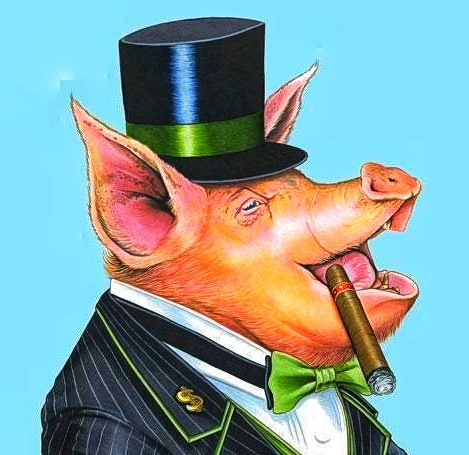When reading through Marx I can’t help but think that capitalism has gotten even worse today than it used to be back then, meaning that the actual mechanisms that drive capital now need much more exploitation and in more forms than they used to.
Also I wonder if some changes of capitalism have also caused the working class to be so completely numb. Workers of the 19th and 20th century knew that the capitalists have opposite needs to them and only through fighting them could they stand to improve their situation. However today people just seem uninterested to really fight for themselves despite the proletariat being a much larger percentage of society compared to the past. I know I’m leaving out some important struggles going on when I’m saying this, but it still makes me wonder what made workers in the past centuries so much more class conscious.
I don’t believe that much, if anything, that Marx critiqued about capitalism has changed on a structural level, but the flow of capital is so complex today, and the collected capital has become so much larger, that it begs the question if this has created some superstructures of capitalism today.
One of the big changes was Imperialism - to the point that when Lenin wrote it, if Marx was around he probably would’ve been like “oh yeah that makes sense” lol
One of the largest differences between capitalism in the 19th century and the 21st century is that it is truly globalized. There are no more frontiers to expand into. Theres imperial super profits to generate, there’s maybe some very distant isolated tribes, but there is no where else to disrupt and expand into the way they did during the scramble for Africa or whatever. We are all in capitalist relations with each other now. They still had plenty of feudalism in Europe all the way up to WW1 if you want to pick a date
For why the imperial proletariate in the global metropol doesnt agitate - they do and did but the state is remarkably efficient at destroying agitators. They’ll kill anyone who gets close like Fred Hampton. And there’s something like a comprador character to the imperial side proletariate, they’ll tolerate the international proletariate getting fucked so long as things stay mostly the status quo and they get enough of what we call (derisively) Treats. Between the modern Bread and Circuses and the whip hand of surveillance capital, people dont feel drawn enough together to risk revolution (for now)
There are no more physical frontiers to expand into, but there is still the frontier of people’s time and attention that is now the objective being expanded into. And perhaps also a maximization of the world’s human population. Ultimately, it has always been people that mattered more than land area.
-
Modern capitalism exists in a world where the soviet union and the socialist challenge existed. That forced them to devise new and improved methods of suppressing worker movements.
-
A big difference is the existence of world-historic economic distortions, namely the existence of a world scale chronic exporter (China) and world scale chronic importers (USA), where the capitalist powers have become massively dependant on (and technologically inferior to) a socialist power.
-
The third difference is that the trends that marx saw appear in the latter half of his life such as joint-stock companies, monopolies, vertical integration and the like have now become the utter norm. Although capitalism had become highly monopolised even as far back as lenin’s time.
-
Capitalism had literally run into its thermodynamic limits. It is a system fueled by fossil fuels and the literal engines of capitalism are literally overheating and running out of fuel. We aren’t fully there yet, but we will be sooner rather than latter.
If aliens looked at our planet, the only meaningful thing they can say our civilization produces is more and more CO2 in the atmosphere and more and more farmland for pigs and cows. It looks like total nonsense at a birds eye view
they’d assume it’s a messed-up low tech terraforming project to heat up the atmosphere utilizing big farting land mammals, covering large amounts of land in sunlight-absorbing black paste, and literally just setting a bunch of shit on fire
we are paving the way for our descendants, the people of plastic, which will have transcended organic life
Capitalism had literally run into its thermodynamic limits.
Thanks for reminding me to finish Fossil Capital! I gotta get back into reading

-
the actual mechanisms that drive capital now need much more exploitation and in more forms than they used to
I would challenge this claim, in Marx’s time Congolese workers would have their hands cut off for missing quotas, or worse. The era of socialist revolutions helped reduce the level of exploitation around the world. Though the shape of things has changed, the core mechanisms of capital today are essentially the same as when Marx was writing (he predicted increasing automation, so even AI is within the scope of his theory).
What he didn’t discuss much in his writings (but was definitely aware of) is the nature of imperialism. Being an imperial subject himself, I think he underestimated the degree to which workers in the imperial core could be convinced their interests align with the imperial bourgeoisie instead of the international working class-- so, even as an organized working class in industrial countries advanced, their material gains actually alienated them from the international working class and severely dulled class consciousness
However, it is precisely because of the internal contractions of capitalism that Marx identified way back in the 19th century that we are seeing a return of class consciousness even in the imperial core. The capitalists just can’t help themselves, the logic of competition pushes them to dismantle the very systems that stabilize the capitalist system. Once again the choice of the workers is becoming clear-- organize or be crushed
I would challenge this claim, in Marx’s time Congolese workers would have their hands cut off for missing quotas, or worse.
I was thinking more about things like insane price gouging, monopolies the likes of Nestle, meta-capitalists like Blackrock, making workers self evaluate themselves and push themselves without any command, extreme competition to find work, and others.
Of course the actual working conditions back then were much worse, working extremely long hours doing mostly manual labour and also actual violence like you mentioned.
Underdevelopment and financial imperialism wasn’t yet articulated, I don’t think.
Marx observed that capitalists continually invest in productive capacity and transition through primitive accumulation into industrial production. Then, over time, this becomes over capacity as the rate of profit declines and this leads to cyclical market crashes.
Underdevelopment seems fundamentally different. The goal in financial imperialism is to prevent the build up of production and to keep the periphery trapped at the bottom of the production chain i.e. raw resource extraction, resource production, and resource transportation.
These underdeveloped regions are trapped in unequal exchange and superexploitation, essentially primitive accumulation is extended rather than transitioning to industrial production, and in this state they generate superprofits for the metropoles to pay off workers higher up the value-added production chain.
The rate of superprofit doesn’t decline, at least, not as cyclically as profit. At this higher stage of capitalism, imperialism, they are not actually building capacity to increase productivity. They are actively preventing industrial capacity building to keep the periphery in a perpetual state of dependency, so the same cycles don’t occur like they do in the metropoles.
There are still limits to growth, but the contractions are between the metropoles and the periphery rather than the bourgeoisie and the proletariat. That’s why national liberation struggles often work with the national bourgeoisie against transnational capital and their compradores.
At least, that’s my read? I just listen to audiobooks at work lol
Capitalism today is far more atomizing than in Marxs time
The existence of the internet and eradication of real communities is probably why
Well, it did further accelerate atomization. But this was always a tendency of capitalism and actually was already trending this way for a long time. I don’t know of a better single citation than “Bowling Alone” even if it is a very centrist liberal perception/interpretation. But this was already more extreme than Marx would have thought in the 90s. A more anecdotal piece of data is that my grandfather was always opining on my parents along with me, my siblings and cousins lack of community and group participation, in contrast to him and his friends volunteering for church activities, rotary clubs, VFW events, etc.
What if we
 this thing and we just accelerate the process of atomization until it saturates at its limit, it splits the atom, and there’s a nuclear dialectical reaction?
this thing and we just accelerate the process of atomization until it saturates at its limit, it splits the atom, and there’s a nuclear dialectical reaction?We just keep getting school shootings from this

Eventually it synthesizes into a new stage, school civil wars, and eventually school imperialist wars or even school world wars.
A strategy needs to be developed concerning:
-
Industrial work being jettisoned from the imperial core. Organizing a factory is much more tried-and-true than organizing a litany of decentralized business ventures that are constantly acquired by corporations participating in labor aristocracy. At this point the west needs entirely different organizing tactics based on material analysis invented to supplement traditional tactics.
-
The insane modern speeds that false consciousness is injected/reinforced into/within the (western?) proletariat.
-
The US dollar hegemony makes it far too easy for the US empire to find supplicant agents in any nation to do their bidding. Whether this takes the form of bribing comprador leaders, fascist death squad financing, or fomenting color revolutions - it is just all too accessible given that the US dollar is accepted as gold everywhere and can be printed for any project the US deems worthy of any effort whatsoever.
For 1, while the mass character of the industrial/factory proletariate is diminished in the sense that there’s literally fewer of them - there’s still some pain points with longshoremen, logistics in general, some manufacturing, (John Deer, UAW, etc), mining, agricultural labor, etc.
Itd be really nice to bring in sectoral scale bargaining or even better revive the IWW. Back in the early 20th century they were organizing hotel workers alongside rail workers.
-
Imperialism, capitalist realism, neocolonialism.
I think the numbness comes in part from the seeming defeat of any new possible future after WW2, with postmodernism coming to replace any semblance of meta-narrative in which human society could evolve into something radically new and positive.
The basic laws are the same, but the gradual quantitative buildup of credit, circulation, rent, etc alongside the growth of imperialism has resulted in a qualitatively different stage of capitalism. As an example, circulation now happens at a far greater speed, which increases the rate of valorization of capital. Credit is a big one, it is now a huge part of the consumer-facing sector of the economy. Of course, there’s also imperialism, the primary contradiction facing the world today, and there are now socialist governments.
It is not quite a difference of time, but something that has to be dealt with is that Marx’s idea of Revolution hasn’t panned out. Instead of the most advanced capitalist economies that had revolutions, it was the semi-periphery (Russia, China, then later decolonializing nations.)
This does tie into qualitative differences from Marx’s predictions because both factory workers or highly concentrated proletariat who could easily be organized didn’t continue increasing until they were an overwhelming majority. Even though the majority of the population was proletarianized, factory work topped off at 20-30% in most capitalist nations. This was the only point where dialectics was kind of ignored, there would be an antithesis, or saturation, rather than the current trends continuing until all firms consolidating and everyone working in a small handful of factories. The transition to service and logistics work starts much earlier in the process of industrialization.
This along with the extreme atomization of capitalism going almost a century longer than Marx expected is likely why the proletariat is so inert.
Middle management didn’t exist in Marx’s time. Management as a profession didn’t start until the 1920s.
Large middle management structures end up with interests opposed to both the workers and the owners. The owners want to maximize value (exploited from the workers) and minimize costs. But management wants to maximize the perception of value (not quite the real thing) and increase the number of middle managers (adding a cost). I think this is important for understanding a lot of the bizarre behaviors we expect from large corporations today.
And I think it may also be important for developing new theories of praxis - if worker actions can exasperate the tensions between owners and management, the two can’t form a unified front against them. (I don’t know what such an action concretely is though.)
This brings Bullshit Jobs to mind.
I don’t think there’s any way for workers to sabotage the middle management and capitalist relations though, because as the book also mentions, middle management is not only there to help capitalists with their metrics and optimization of labour. It’s also there to legitimize and make the owners look good, to act as a protective buffer against the workers by playing a kind of “good cop / on your side” role, and to create enough labour aristocracy so the organizing workers don’t reach a critical mass.
Modern office jobs, unlike the factories, give you a much closer person above you, with a much smaller class difference, sometimes even doing work themselves, that is responsible to not only keep you in line and performant, but to also “help” you improve every evaluation period. Workers are much more likely to lick the boot when they feel like a manager will notice them and appreciate them, and when they have a certain list of improvement areas to constantly improve on hoping to get that annual raise.
I think that as long as they can still be profitable enough to keep middle managers happy and complacent, they are never going to break that relationship.
 10·14 days ago
10·14 days agoImperialism is an important development.
Didn’t imperialism exist even in Marx’s time?
Absolutely, but capitalist imperialism as characterized by the merger of bank and industrial capital to create financial capital, and the export of financial capital, hadn’t really reached its tipping point until the turn of the century and WW1.
Where can one read more about this?
A ridiculously incomplete, cursory introduction to Marxist analysis of imperialism:
https://en.wikipedia.org/wiki/Imperialism_(Hobson_book)
https://www.marxists.org/archive/lenin/works/1916/imp-hsc/imperialism.pdf
https://annas-archive.org/md5/241a16acc7eb07bd1707cf75ebe645b1
https://annas-archive.org/md5/ff7fa10d4aaccd98c0195172f164e7f2
Thanks, comrade.
deleted by creator















